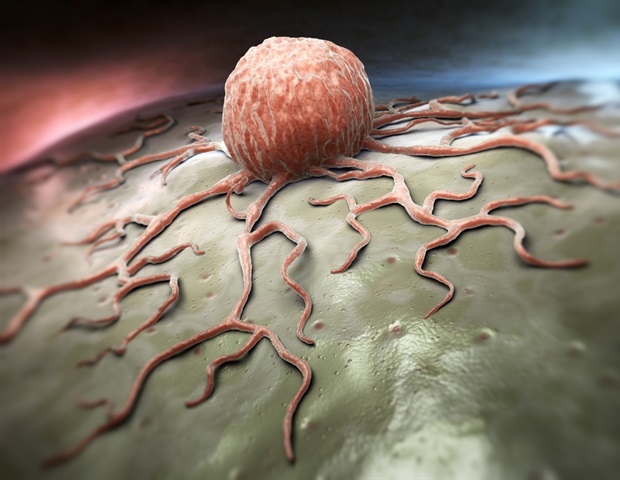
Specifically packaged DNA secreted by tumor cells can set off an immune response that inhibits the metastatic unfold of the tumor to the liver, based on a examine led by researchers at Weill Cornell Medication, Memorial Sloan Kettering Most cancers Middle and Korea’s Yonsei College. The invention improves the scientific understanding of most cancers development and anticancer immunity, and will yield new scientific instruments for assessing and lowering metastasis danger.
Within the examine, reported Dec. 3 in Nature Most cancers, the researchers examined most cancers cells’ secretion of brief stretches of DNA packaged on tiny capsules known as extracellular vesicles (EVs). All cells use EVs to secrete proteins, DNA and different molecules, and tumor cells are significantly energetic EV secreters. The organic capabilities of those EV-packaged molecules are nonetheless being explored, however on this case, the researchers found that in numerous most cancers sorts, EV-DNA secreted by tumor cells works as a “hazard” sign that prompts an anti-tumor response within the liver, lowering the chance of liver metastasis.
Initially we hypothesized that extra tumor EV-DNA would imply a worse prognosis, however we had been stunned to search out the other.”
Dr. David Lyden, examine co-senior writer, the Stavros S. Niarchos Professor in Pediatric Cardiology and professor of Pediatrics and of Cell and Developmental Biology at Weill Cornell Medication
The opposite co-senior authors of the examine are Dr. Han Sang Kim, affiliate professor at Yonsei College Faculty of Medication and a visiting affiliate professor of Molecular Biology Analysis in Pediatrics at Weill Cornell Medication; and Drs. Yael David and Jacqueline Bromberg of Memorial Sloan Kettering Most cancers Middle. The primary writer of the examine is Dr. Inbal Wortzel, a analysis affiliate within the Lyden laboratory.
Dr. Lyden and colleagues have present in prior analysis that tumor cells secrete snippets of EV-DNA from throughout their genomes, together with items with cancer-associated mutations. Within the new examine, they took a extra complete have a look at tumor EV-DNA, and in early experiments discovered one thing surprising.
“We had assumed that this DNA is within the type of ‘bare’ strands inside EVs, however we had been stunned to search out that it’s totally on the EV floor, wrapped round help proteins known as histones, a lot as it will be in a chromosome,” mentioned Dr. Wortzel.
With the assistance of Dr. David’s lab, the researchers decided that these histone proteins have a singular set of modifications, hinting that EV-DNA has a selected signaling perform.
The workforce additionally recognized a number of genes that assist regulate EV-DNA packaging, and located that when considered one of these, APAF1, was absent, the quantity of EV-DNA secreted by tumor cells was sharply diminished.
Different current work by Dr. Lyden and colleagues has proven that most cancers cells can secrete EV-packaged proteins and fatty acids that make the liver extra hospitable for metastatic tumor improvement. The workforce due to this fact suspected that tumor-secreted EV-DNA additionally would promote metastasis. Nevertheless, in animal fashions of pancreatic and colorectal most cancers, boosting tumor EV-DNA ranges lowered metastasis risk-;whereas lowering tumor EV-DNA ranges by way of genetic deletion of APAF1 tremendously raised that danger.
“We additionally discovered that in colorectal most cancers sufferers, these with low ranges of EV-DNA of their tumors on the time of analysis had been extra prone to develop liver metastases in a while, in comparison with these with excessive EV-DNA ranges,” Dr. Kim mentioned.
The researchers found that tumor EV-DNA is taken up by liver-resident immune cells known as Kupffer cells, that are spurred by marks of harm within the EV-DNA to prepare immune cell clusters that resist liver metastases.
“This can be a tumor suppressor mechanism that had not been described earlier than, and we expect the cancers that may flip it off, by secreting much less EV-DNA, have a greater likelihood of spreading,” Dr. Wortzel mentioned.
The researchers now hope to develop an EV-DNA-based prognostic check for metastasis danger, in addition to a vaccine-like remedy to reinforce tumor EV-DNA signaling and suppress metastasis in sufferers with early stage most cancers.
Supply:
Journal reference:
Wortzel, I., et al. (2024). Distinctive structural configuration of EV-DNA primes Kupffer cell-mediated antitumor immunity to forestall metastatic development. Nature Most cancers. doi.org/10.1038/s43018-024-00862-6.